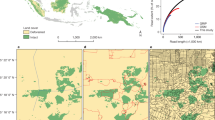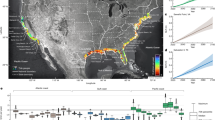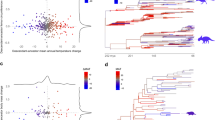Abstract
How should human societies act to enhance ecological integrity and improve human well-being in tandem, now and in the future? In this Perspective, we suggest that this question is not simply a matter of defining the appropriate science and policy, or in achieving improvements in the quality of science communication. Instead, science and policy must draw from deeper waters. We discuss a deeper transdisciplinary approach that gives attention to the meanings that societal groups find in their environments, as well as the ways in which these meanings are embedded in landscapes and other aspects of material culture and inform the individual and collective sense of self. A humanistic environmental science, in short, examines human experience of a dynamic, yet changeable nature.
This is a preview of subscription content, access via your institution
Access options
Access Nature and 54 other Nature Portfolio journals
Get Nature+, our best-value online-access subscription
$29.99 / 30 days
cancel any time
Subscribe to this journal
Receive 12 digital issues and online access to articles
$119.00 per year
only $9.92 per issue
Buy this article
- Purchase on Springer Link
- Instant access to full article PDF
Prices may be subject to local taxes which are calculated during checkout
Similar content being viewed by others
References
IPCC Climate Change 2007: Impacts, Adaptation and Vulnerability (eds Parry, M. L. et al.) (Cambridge Univ. Press, Cambridge, 2007).
Millennium Ecosystem Assessment Ecosystems and Human Well-Being: Our Human Planet: Summary for Decision Makers (Earthscan, 2005).
IPCC Climate Change 2014: Synthesis Report (eds Core Writing Team, Pachauri, R. K. & Meyer L. A.) (IPCC, 2015).
Rockström, J. et al. A safe operating space for humanity. Nature 461, 472–475 (2009).
GDP (current US$) World Bank https://data.worldbank.org/indicator/NY.GDP.MKTP.CD (accessed 9 May 2018).
Robbins, P. Political Ecology (Blackwell, Malden, 2004).
Fine, B. The World of Consumption: The Material and Cultural Revisited (Routledge, London, 2002).
Daly, H. E. Beyond Growth: The Economics of Sustainable Development (Beacon Press, Boston, 1996).
Jackson, T. Prosperity Without Growth: Economics for a Finite Planet (Earthscan, London, 2009).
Stern, N. The Economics of Climate Change: The Stern Review (Cambridge Univ. Press, Cambridge, 2007).
World Commission on Environment and Development Our Common Future (Oxford Univ. Press, Oxford, 1987).
Norton, B. C. Sustainability: A Philosophy of Adaptive Ecosystem Management (Univ. Chicago Press, Chicago, 2005).
Foster, J. The Sustainability Mirage: Illusion and Reality in the Coming War on Climate Change (Earthscan, London, 2008).
Niles, D. Moving beyond the orthodoxies in ‘sustainable agriculture’. Senri Ethnolog. Rep. 33, 421–452 (2009).
United Nations Environment Program Towards a Green Economy: Pathways to Sustainable Development and Poverty Eradication (2011).
Krueger, R. & Gibbs, D. in The Sustainable Development Paradox: Urban Political Economy in the US and Europe (eds Krueger, R. & Gibbs, D.) 1–11 (Guilford Press, New York, 2007).
Swyngedoux, E. in The Sustainable Development Paradox: Urban Political Economy in the US and Europe (eds Krueger, R. & Gibbs, D.) 13–40 (Guilford Press, New York, 2007).
Tachimoto, N. (ed.) Global Humanics of the Environment (RIHN, Kyoto, 2008).
Acselrad, H. in The Crisis of Global Environmental Governance: Towards a New Political Economy of Sustainability (eds Park, J., Conca, K. & Finger, M.) 96–109 (Routledge, London, 2008).
Park, J., Conca, K. & Finger, M. The Crisis of Global Environmental Governance: Towards a New Political Economy of Sustainability (Routledge, London, 2008).
Kates, R. W. & National Research Council Board on Sustainable Development Our Common Journey: A Transition Toward Sustainability (National Academy Press, Washington DC, 1999).
Speth, J. G. The Bridge at the End of the World: Capitalism, the Environment, and Crossing from Crisis to Sustainability (Yale Univ. Press, New Haven, 2008).
Raskin, P. et al. Great Transition: The Promise and Lure of the Times Ahead (Stockholm Environment Institute, 2002).
Handmer, J. & Dovers, S. A Typology Of Resilience, The Earthscan Reader on Adaptation to Climate Change (eds Schipper, E. L. F. & Burton, I.) 187–210 (Earthscan, London, 2009).
Brondizio, E. S., Ostrom, E. & Young, O. R. Connectivity and the governance of multilevel social-ecological systems: The role of social capital. Annu. Rev. Env. Res. 34, 253–78 (2009).
Earth System Science for Global Sustainability: The Grand Challenges (International Council for Science, 2010).
The Belmont Challenge: A Global, Environmental Research Mission for Sustainability (International Group of Funding Agencies for Global Change Research, 2011); https://www.belmontforum.org/wp-content/uploads/2017/04/belmont-challenge-white-paper.pdf
Larigauderie, A. & Mooney, H. A. The intergovernmental science-policy platform on biodiversity and ecosystem services: moving a step closer to an IPCC-like mechanism for biodiversity. Curr. Opin. Env. Sustain. 2, 9–14 (2010).
Perrings, C., Duraiappah, A., Larigauderie, A. & Mooney, H. The biodiversity and ecosystem services science-policy interface. Science 331, 1139–1140 (2011).
Weichselgartner, J. & Kasperson, R. Barriers in the science-policy-practice interface: toward a knowledge-action-system in global environmental change research. Glob. Env. Change 20, 266–277 (2010).
Norton, B. C. Sustainability: A Philosophy of Adaptive Ecosystem Management 49 (Univ. Chicago Press, Chicago, 2005).
Hulme, M. Geographical work at the boundaries of climate change. Trans. Inst. Brit. Geogr. 33, 5–11 (2008).
Hulme, M. Problems with making and governing global kinds of knowledge. Glob. Env. Change 20, 558–564 (2010).
Sterman, J. D. Risk communication on climate: mental models and mass balance. Science 322, 532–533 (2008).
Vogel, C., Moser, S. C., Kasperson, R. E. & Dabelko, G. D. Linking vulnerability, adaptation, and resilience science to practice: pathways, players, and partnerships. Glob. Env. Change 17, 349–364 (2007).
Hirsch Hadorn, G., Bradley, D., Pohl, C., Rist, S. & Wiesmann, U. Implication of transdisciplinarity for sustainability research. Ecol. Econ. 60, 119–128 (2006).
Jasanoff, S. A new climate for society. Theor. Cult. Soc. 27, 233–253 (2010).
Nicolescu, B. Manifesto of Transdisciplinarity (State Univ. New York Press, Albany, 2002).
Hulme, M. Learning to live with recreated climates. Nat. Cult. 5, 117–122 (2010).
Max-Neef, M. A. Foundations of transdisciplinarity. Ecol. Econ. 53, 5–16 (2005).
Nicolescu, B. Transdisciplinarity: Theory and Practice (Hampton, Cresskill, 2008).
Pohl, C. & Hirsch Hadorn, G. Principles for Designing Transdisciplinary Research (Oekom, München, 2007).
Hirsch Hadorn, G., Bradley, D., Pohl, C., Rist, S. & Wiesmann, U. Implication of transdisciplinarity for sustainability research. Ecol. Econ. 60, 119–128 (2006).
Hirsch Hadorn, G. et al. in Handbook of Transdisciplinary Research (eds Hirsch Hadorn, G. et al.) 19–39 (Springer, 2008).
Latour, B. Politics of Nature: How to Bring the Sciences into Democracy (Harvard Univ. Press, Cambridge, 2004).
Geertz, C. The Interpretation of Cultures: Selected Essays (Basic Books, New York, 1973).
Descola, P. Prof. Philippe Descola: winner of the 2012 CNRS Golden Medal. College de France Newsletter (July, 2015).
Tuan, Y.-F. Space and Place: The Perspective of Experience (Univ. Minnesota Press, Minneapolis, 2001).
Niles, D. The charcoal forest: ecology, aesthetics and the Anthropocene. Pre-print at SocArXiv https://doi.org/10.31235/osf.io/hk5g8 (2018).
Lemonnier, P. Mundane Objects: Materiality and Non-Verbal Communication (Routledge, London, 2016).
Basso, K. H. Wisdom Sits in Places: Landscape and Language Among the Western Apache (Univ. New Mexico Press, Albuquerque, 1996).
Kohn, E. How Forests Think: Toward and Anthropology Beyond the Human (Univ. California Press, Berkeley, 2013).
Renn, J. & Laubichler, M. in Integrated History and Philosophy of Science (ed. Stadler, F.) 109–125 (Vienna Circle Institute Yearbook Vol. 20, Springer, 2017).
Bonneuil, C. & Fressoz, J.-B. The Shock of the Anthropocene: The Earth, History, and Us (Verso, London, 2015).
Niles, D. in Oxford Handbook of Heritage Studies (eds. Labrador, A. & Silberman, N.) Ch. 4.5 (Oxford Univ. Press, Oxford, 2018).
Renn, J. From the history of science to the history of knowledge—and back. Centaurus 75, 37–53 (2015).
Tachimoto, N. in Global Humanics of the Environment (ed. Tachimoto, N.) RIHN Working Paper No. 1; 5–10 (RIHN, Kyoto, 2008).
Acknowledgements
Narifumi Tachimoto is Professor Emeritus and was Director General (2007–2013) at the Research Institute for Humanity and Nature and was President of the National Institutes for the Humanities (2014–2018).
Author information
Authors and Affiliations
Contributions
N.T. and D.N. contributed equally to the conceptualization of this Perspective and D.N. wrote the bulk of the text.
Corresponding author
Additional information
Publisher’s note: Springer Nature remains neutral with regard to jurisdictional claims in published maps and institutional affiliations.
Rights and permissions
About this article
Cite this article
Niles, D., Tachimoto, N. Science and the experience of nature. Nat Sustain 1, 540–543 (2018). https://doi.org/10.1038/s41893-018-0124-y
Received:
Accepted:
Published:
Issue Date:
DOI: https://doi.org/10.1038/s41893-018-0124-y



